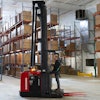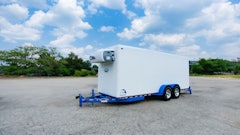Cost Of Unsaleables Continues To Decline
For the second consecutive year, the cost of unsaleables has gone down for consumer products manufacturers, according to the 2005 Unsaleables Benchmark Report released July 20 at the Joint Unsaleables Management Conference.
The report found that the cost of unsaleables, including damaged, expired, out-of-date and seasonal merchandise, was reduced by $50 million between 2003 and 2004. Total industry cost of unsaleables is projected to be $2.52 billion in 2004.
However, only 56 percent of respondents in this years survey reported lower rates of unsaleable costs vs. the previous year, virtually identical to last years 55 percent year-to-year rate decline.
The 2005 report found that manufacturers and retailers are employing a variety of tactics to cut the cost of unsaleables, including working together to improve product packaging and shipping. Companies also are manufacturing directly to pallet to reduce handling and damage, and instituting programs to help relieve retailers of excess product due to product failures and seasonal items.
"While we continue to make progress, more can be done to reduce unsaleables. As this years report has shown, reducing the cost of unsaleables is not simple, guaranteed or enduring without a focused commitment to improvement and collaboration between trading partners," says Karin Croft, senior director of industry affairs for the Grocery Manufacturers Association (GMA).
Also at the conference, GMA singled out Campbell Soup, Camden, NJ, and Food Lion, Salisbury, NC, for working together to identify a packaging flaw in Campbells V8 and tomato juice. The two companies were among four companies honored with the 2005 Innovation Award, along with Kellogg, Land OLakes and MeadWestvaco.
Tyson To Expand, Combine Poultry Plants
Tyson Foods is expanding poultry plants in Russellville, AR, and Forest, MI, to increase production of value-added products and boost operating efficiencies. It will also close a plant in Bentonville, AR, Oct. 1
The expansion in Russellville will increase Tysons processed chicken capacity by almost 60 percent and enable it to absorb operations from the plant in Bentonville. At the Forest plant, Tyson will install several new chicken processing lines, enabling it to combine two plants there into one facility by early 2006.
"These are major projects we believe will contribute to our goals to increase value-added product sales and streamline our ability to produce and deliver the high-quality products our customers have come to expect," says Bill Lovette, group vice president of food service, Tyson Foods, based in Springdale, AR.
Once the project is completed next year, Tyson will close an older plant in Forest and shift production and workers to the newly upgraded, 325,000-square-foot facility.
IFDA Releases Safety, Recall Manuals
The International Foodservice Distributors Association (IFDA) has released two new manuals that provide operational information for managing facility inspections and product recalls.
The "FDA and USDA Inspection Manual for Foodservice Distributors," provides guidance on distributor rights and responsibilities in handling a visit from food safety regulators. It was crafted in response to the Bioterrorism Act of 2002, and serves as a tool for the foodservice industry to cope with the anticipated increase in food inspections.
Foodservice distributors can use the manual as a template for establishing a new set of procedures or can compare the manual guidance to existing programs to find ways to enhance procedures.
The second manual, "Effective Recall Management for Foodservice Distributors," provides guidance that can improve a companys processes for product recall or market withdrawal and details new requirements under the Bioterrorism Act. It provides insights in how to deal with suppliers, customers, regulators and the media, and how to minimize business disruptions. It also explains rules and regulator schemes relating to recalls, provides guidance on conducting timely and efficient recalls and captures industry best practices in recall management.
IFDA members can purchase each manual for $175 per copy and non-IFDA members for $525 per copy. For more information, go to www.ifdaonline.org.
Orange Glo, Unilever Receive Recognition
Oange Glo International and Unilever Foods were among seven transportation management leaders cited in a study by the Aberdeen Group, based in Boston.
Both companies use Holland, MI-based LeanLogistics On-Demand TMS (transportation management system) and are featured in the report, "Best Practices in Transportation Management-Case Studies on How Companies Are Driving Cost and Service Improvements."
"Best practice leaders are successfully transforming their transportation operations to drive increased value for their business," says Beth Enslow, senior analyst, AberdeenGroup. "Companies like LeanLogistics are providing the tools to help supply chain and transportation executives meet the transportation rate and capacity challenges that plague their organizations today."
Orange Glo International, a household cleaning supplies manufacturer based in Denver, was selected for its improvements in service levels and launch of a carrier ease of business program to reduce rates and secure capacity. Using LeanLogistics solution, the company centralized transportation control to manage outbound freight to customers, giving visibility to all parties, allowing them to act proactively to meet customer service levels.
Orange Glos initiative saved $1 million in the first eight months and directly helped increase revenue.
Unilever Foods implemented the LeanLogistics on-demand solution to create customer-centric transportation processes, allowing it to improve on-time delivery dramatically, keep customers better informed about requested arrival date exceptions, and proactively plan for on-shelf availability for promotional activity.
USCS Builds RFID Center
U.S. Cold Storage is building a facility in Dallas to develop best practices for applying radio frequency identification (RFID) technology in the cold chain.
Dubbed the RFID Solution Center, it will help USCS meet RFID mandates by retailers and suppliers-including Wal-Marts 2006 mandate for two-tier suppliers. Cognizant Technology Solutions, an application outsourcing provider based in Teaneck, NJ, is helping USCS develop the RFID infrastructure.
"The center will demonstrate our ability to provide business solutions that fulfill the RFID mandates and requirements of large global retailers, manufacturers and other supply chain partners," says Tim Brennan, director of IT for USCS, based in Cherry Hill, NJ. D
RFID Deployment Finally Takes Hold
AMR Research released a report assessing the radio frequency identification (RFID) market from 2005-2007. Sixty-nine percent of respondents are planning to evaluate, pilot or implement RFID in 2005, with the average budget for RFID at more than $548,000, increasing to $771,000 by 2007.
Among key factors driving implementation of RFID, compliance remains at the top.
The report, based on a survey of 500 companies and conducted with RFID Journal, identified several key issues facing the RFID market:
- The opportunity for market technology leadership in RFID is wide open, with no one vendor establishing an early leadership position;
- The overwhelming majority of survey respondents cite significant challenges finding the return on investment (ROI) to justify their RFID spending. Twenty-eight percent cite it specifically as their biggest obstacle with regard to RFID adoption;
- A lack of standards maturity continues to be a key factor, especially for process manufacturers; only 29 percent believe the standards have reached an appropriate level of maturity.
"RFID is still in its formative years," says Dennis Gaughan, research director, AMR Research, Boston. "The market will be hotly contested across all technology segments from tags and readers through middleware and enterprise applications."
Good Times For WMS Vendors
The worldwide market for warehouse management systems (WMS) has had its best year in several years, according to research from ARC Advisory Group, Dedham, MA.
After several slow years, the market grew by more than 5 percent in 2004. The market was $1.07 billion in 2004 and is forecasted to reach more than $1.34 billion in 2009, according to a new ARC Advisory Group study, "Warehouse Management Systems Worldwide Outlook Through 2009."
"Based on the number of acquisitions and mergers in this market-there were more than 20 acquisitions or mergers of companies with WMS solutions-the market's growth has been surprisingly strong," says Steve Banker, service director for supply chain management at ARC. "While some acquired companies with WMS solutions can expect to continue to grow their revenues, historically mergers and acquisitions have more often served as a drag on growth."
Companies that were active in 2004 and 2005 included:
- Oracle, which acquired PeopleSoft in December 2004. Previous to this, PeopleSoft acquired JD Edwards;
- Infor, which acquired Lilly Software Associates, NxTrend and daly.commerce between March and September 2004;
- Retalix, which acquired OMI International in January 2004, and IDS earlier this year;
- RedPrairie, which acquired LIS, a prominent European supplier, in February 2004, and, in turn, was acquired by Francisco Partners, a private venture fund, in May;
- HighJump Software, which was acquired by 3M in January 2004;
- Catalyst International, which was acquired by ComVest Investment Partners in September 2004; and
- Yantra, which was acquired by Sterling Commerce in January 2004.
According to the report, though, depending on the research cited, 50 percent to 80 percent of acquisitions never produce the anticipated benefits. The WMS market withstood the surge in acquisitions this year; the true test will be to see how well the acquired companies' revenues hold up in coming years, it concluded.













